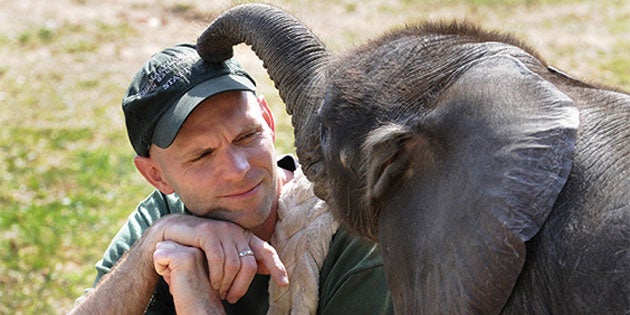Mike McClure ’94 has a job with big responsibilities. As the general curator and elephant manager at The Maryland Zoo in Baltimore, McClure is responsible for more than 1,500 animals, including a handful of elephants. The biology major began his career in animal care at Charles Towne Landing, where McClure helped rebuild the park following Hurricane Hugo’s arrival in South Carolina in September 1989. Since graduating from the College with a biology degree, he’s worked at The Maryland Zoo in Baltimore for more than 20 years, becoming a well-regarded elephant trainer. Elephants, he explains, can be “incredibly intelligent,” “very emotional” and “very perceptive.” Working with one sensitive charge, he says, is like “walking around tied to a 8,000-pound lie detector…you really can’t sneak anything by her.”
McClure was kind enough to share his expertise and answer some questions about elephants. For those who want to learn even more, listen to McClure talk about his work with elephants, including their reproduction, in the audio clip below (which was originally recorded as part of The Stoop Storytelling Series in Baltimore).
Q: Tell us about the elephants you work with on a regular basis. What are their personalities like?
A: Elephants are like people, they all have patterns of behavior and responses to their environment that can be interpreted as what we call a personality. Our oldest female, “Anna,” is a very calm and fairly predictable animal. She tends to be a bit submissive to the other elephants but is also one of the most playful. Our younger adult female, “Felix,” is our most alert and excitable elephant and she is the mother of our youngest elephant, a male named “Samson.” He tends to be the most bold of all of the elephants and is often the most perceptive of them. It is apparent in his problem solving skills and his adaptability to new things. Our adult male elephant, “Tuffy,” tends to be the most cautious about everything but he is always watching and studying things carefully and, despite being a full grown, mature bull, he spends a lot of time playing.
Q: What’s a typical day on the job?
A: When animals are involved, there is really no such thing as a “typical day.” As the general curator for the Animal Department, every day presents new challenges in managing a collection of over 1500 animals and the staff that care for them. Animals never seem to understand the concept of schedules or appointments or paperwork and often that end of the job gets bumped in favor of health issues, animal behavior needs, breeding programs and unexpected procedures. If anything were to resemble a typical day, it would start with reviewing reports and emails and then meeting with lots of different managers to coordinate the wide variety of needs that we artfully juggle every day. For instance, yesterday began with emails then routine medical exams on some new rattlesnakes, followed by meetings with other zoo departments, a quarterly budget review and a little bit of elephant training and husbandry thrown in for good measure.
Q: How do you help elephants stay healthy through your work?
A: Our focus is on preventive medicine and husbandry. An active, mentally stimulated elephant is a healthy elephant and staff spend all day working with them in a variety of training and exercise sessions. During these regular sessions, staff develop a clear picture of each elephant’s health, behavior, locomotion and appetite patterns. With a clear picture of all of this in mind, it becomes easier for staff to identify when things are starting to go wrong and to address it before it becomes a problem. The training we do allows us to have full access to the elephants for voluntary interactions in which we can perform any number of medical procedures on demand including blood draws, vaccinations, full body exams, enemas (yes you read that right), ultrasound exams, etc.

McClure with Samson, the first African elephant born at The Maryland Zoo in Baltimore (photo courtesy of The Maryland Zoo).
Q: What is one of your favorite parts of the job?
A: My favorite part of my job is helping the people who work with the animals to be successful in their work. If we are successful, then the animals are thriving and when people see the validation of their work in a healthy animal, it is very rewarding. The animal management field is full of difficult situations, long hours and mysteries to unfold and when you overcome the odds because of all of the hard work you have put in for years, it is one of the most satisfying feeling you can experience.
Q: What are some of the tougher aspects of your work?
A: The toughest aspect of the work is the fact that not every situation can be solved or averted and that sometimes due to illness or age, you cannot prevent the loss of the animals that we work so hard for every day. As animal management professionals, this is part of the job that we all acknowledge and, to some degree, accept, but when it comes time to say good bye to another living creature that you have invested so much of your own life into, its never an easy task.
Q: Have you been able to train elephants to do any tasks of which you’re particularly proud?
A: Our young male once became very ill with a virus that has an 85 percent mortality rate in young elephants. Due to our early detection of subtle symptoms and the training I had done with him since his birth, we were able to help him survive. I remain proud of the fact that our work with him allowed us to save his life and to learn so much about this virus in order to be able to help other elephants in the future.
Q: We’ve all heard an elephant never forgets. Do they indeed have superb memories? What has been your personal experience?
A: It has now been proven that an elephant’s capacity for memory far exceeds our own and I have seen that proven time and again. Elephants can recognize each other and the people they have worked with even when they have spent many years apart and if you approach them as though no time has passed since the last time you saw them, they will do the same. Their capacity for memory is one of the truly amazing things about them that I admire since it means that you have to be consistent with them any time you are around them because they never forget a thing.
Q: Are elephants really afraid of mice? What else do elephants dislike?
A: Elephants tend to view things as either safe or dangerous. Everything is dangerous until they learn that it is safe and a fast moving little object like a mouse could easily startle them. Their eyesight is not their strongest sense and they can certainly react strongly to unexpected things. I think this is where the belief that they are afraid of mice might have originated and I have to say that it is not that untrue from a certain perspective! However, in my experience, elephants do not dislike anything in particular unless they have learned to do so through association. Just like us, if something scares them, tastes bad or causes an injury, they are more likely to avoid that thing in the future and this could be interpreted as disliking something from our point of view.
Q: Do elephants truly enjoy peanuts? Any other foods they seem to like more?
A: Of course they do…but elephants will eat clay and dirt sometimes too…their tastes are not too refined and they will try a lot of things. African elephants in particular are broad generalists and eat a huge variety of different plant matter…bark, leaves, branches, roots, grasses, fruits, etc. Their favorite items seem to be fresh browse such as leaves and tree branches (they can actually eat logs that are up to several inches in diameter!) and they greatly enjoy tearing trees apart to chew on!
Q: If a college student is interested in becoming an animal trainer, what are some steps you’d recommend they take to prepare for this career?
A: Direct experience is the best way to prepare for this career. Volunteering at professional animal facilities, completing internships, seasonal jobs and wildlife rehabilitation work are all good ways to develop a true sense of what animal management entails and to get the exposure needed to then parlay a college degree into a career. There is a lot of general and inaccurate information available on the internet that tries to paint a picture of what animal management is, especially in relation to elephants, but without direct experience, it is impossible to really know what the career entails. While working on obtaining a 4-year degree in biology, zoology or other life sciences, I strongly encourage people to get out in the field and find out what it really means to work with animals and to let that experience inform your decisions for your career.





